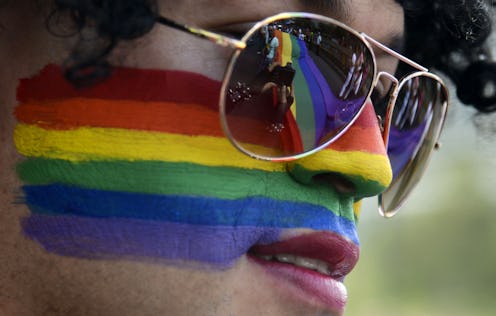Life
How The Criminal Justice System Fails LGBTQ People
There are a lot of systemic problems in our criminal justice system, and one of the worst seems to be the mistreatment of LGBTQ peopleL According to a new report from Movement Advancement Project (MAP), LGBTQ people are unfairly targeted by the criminal justice system. And at a time when the nation is grappling with the inequality in this system, it's important to make sure this isn't left out of the conversation.
So how bad is the problem? According to the report, LGBTQ people are much more likely to be incarcerated than their heterosexual, cisgender peers. Roughly 3.8 percent of Americans openly identify as LGBTQ, but LGBTQ people make up about 7.9 percent of the prison population in the US, including both state and federal prisons. In other words, they're more than twice as likely to be incarcerated.
Meanwhile, 16 percent of trans people say they've spent time in jail or prison, compared to only about five percent of American adults overall. And it seems the problem isn't going anywhere either — somewhere between 12 and 20 percent of people held in juvenile detention are LGBTQ, whereas only about seven percent of young people identify that way. So the problem isn't just an after effect of years gone by.
So what's causing this discrepancy? MAP lays out a few broad issues. First, LGBTQ people often face discrimination both in their personal and professional lives, which puts people at an elevated risk of homelessness, especially youth. And since our country is increasingly trying to criminalize the homeless, this often leads to to LGBTQ people being jailed.
Additionally, although most states have repealed their laws blatantly criminalizing LGBTQ people, many discriminatory laws still remain on the books. The report notes as an example, "HIV criminalization laws, for example, rely on outdated science and are enforced based on stigma. The result is that people living with HIV are in constant fear of being prosecuted and jailed." (HIV criminalization laws are outdated laws that criminalize many safe behaviors of HIV-positive people, such as having consensual, protected sex. Though not aimed specifically at LGBTQ people, they disproportionately affect them.)
Also, even when laws themselves are not discriminatory, their enforcement often is. According to the report, LGBTQ people and LGBTQ neighborhoods are often targeted by law enforcement, particularly LGBTQ people of color. MAP notes that members of the LGBTQ community is also at greater risk of being victim to abusive force on the part of police, especially when they are also people of color or low-income people.
What's more, once arrested, LGBTQ people are more likely to be sentenced to prison time. The report indicates that prosecutors have often been known to use a person's gender or sexual identity against them. Once incarcerated, they are also more likely to be placed in solitary confinement, and trans people often face the additional nightmare of being assigned to a prison that matches the gender identity they were assigned at birth, rather than the one by which they identify.
In other words, there are a lot of reasons why the criminal justice system fails the LGBTQ community, but they all produce one end result: LGBTQ people are disproportionately likely to be incarcerated.
"It used to be a crime to be LGBT in the United States, and while police are no longer raiding gay bars, LGBT people, especially LGBT people of color, are still disproportionately pushed into the criminal justice system," MAP executive director Ineke Mushovic said in a statement. "They are treated unfairly within the system and in correctional settings, and face extraordinary challenges in rebuilding their lives."
Nor is MAP the first group to come to these same conclusions. But the good news is, we might be able to do something about it.
"America’s criminal justice system is under a spotlight," the report notes. "High-profile instances of police misconduct, combined with high rates of incarceration for nonviolent offenses, and shocking rates of recidivism for formerly incarcerated people, have made criminal justice reform the rare issue where there is widespread, bipartisan agreement that change is needed." And part of reform, they argue, should be changes to the way the LGBTQ community is treated by the criminal justice system.
Given the attention criminal justice reform is getting, we have the opportunity to make some real changes right now. Let's make sure those changes include more protections for LGBTQ Americans.
You can find the full MAP report here.
